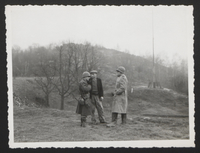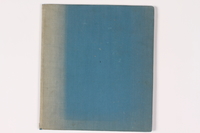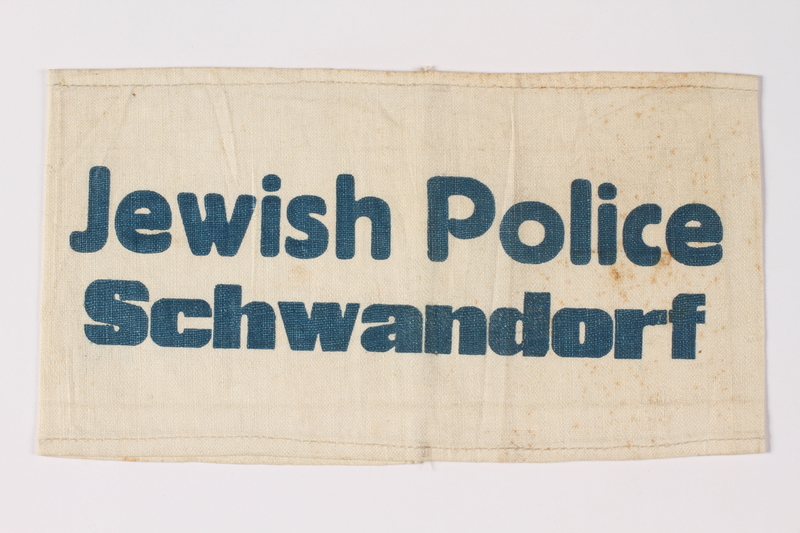Overview
- Brief Narrative
- Schwandorf Jewish police armband acquired by Joseph W. Eaton, 26, presumably after the war in Schwandorf displaced persons camp in Germany. Joseph had lived in the United States since November 1934 when his parents sent him away from Berlin, Germany. After joining the Army in 1942, he was trained in military government and psychological warfare at Camp Ritchie. He entered combat six weeks after D-Day, June 4, 1944, as part of the 4th Mobile Broadcasting Unit, Allied Headquarters. He was part of a handpicked Press and Publications Unit responsible for radio and print propaganda for German troops and civilians to break morale and encourage surrender. He interviewed prisoners of war and reported on liberated concentration camps and German towns. Germany surrendered on May 7, 1945, and Joseph's unit convinced General Eisenhower of the need to establish a free press throughout Germany. Joseph was editor of the weekly paper in Straubing, providing local news on practical issues like rationing, as well as stories on conditions in liberated concentration camps, DP camps, and the situation of Jewish refugees who did not want repatriated to their native lands. Joseph’s parents, Jacob and Flora, were murdered in Sobibor killing center and his maternal grandmother, Cilli Goldschmidt, died of starvation in Theresienstadt.
- Date
-
received:
1945 May-1945 September
- Geography
-
received:
Schwandorf (Displaced persons camp);
Schwandorf (Germany)
- Credit Line
- United States Holocaust Memorial Museum Collection, Gift of Joseph W. Eaton
- Markings
- front, stenciled, blue ink : Jewish Police / Schwandorf
- Contributor
-
Subject:
Joseph W. Eaton
- Biography
-
Josef Wechsler was born on September 28, 1919, in Nuremberg, Germany, to an Orthodox Jewish couple, Jacob and Flora Goldschmidt Wechsler. Josef had three brothers: Siegfried, born in 1913, Martin, born in 1915, and Herbert, born in 1921. Jacob was born on January 27, 1885, in Furth, to Joseph and Hannah Rosenbaum Wechsler. He had three brothers. Jacob served in the German Army for four years during World War I (1914-1918). Flora was born on December 28, 1890, in Frankfurt, to Isaac and Cilly Hamburger Goldschmidt. Their families had lived in Germany since the 1400’s. Jacob and Flora married in 1912 in Frankfurt. Jacob owned a shaving brush factory in Nuremburg. Josef attended a Jewish grade school. In 1930, the family moved to Berlin when Jacob’s factory went bankrupt as a result of the economic crash. Jacob worked for a company selling shaving brushes.
In January 1933, Hitler came to power in Germany. An anti-Semitic Nazi dictatorship was established soon after. Jacob lost his job and Josef and his brothers were expelled from school because they were Jewish. Josef attended a Jewish school, the Goldschmidt School. Jacob and Flora looked for ways to emigrate. They could not get visas so they decided to send their children out of the country. On November 14, 1934, 15 year old Josef sailed from Hamburg on the SS President Harding, arriving in New York on November 24. His 13 year old brother Herbert had been sent to New York the previous week. They were sponsored by the German Jewish Children’s Aid, which helped 20,000 Jewish children go to the United States to finish their education. Josef lived in several foster homes in New York. He changed his name to Joseph. In 1935 and 1936, Joseph’s brothers Siegfried and Martin went to Palestine. They changed their names to Shlomo and Moshe. At age 16, Joseph graduated from high school and began college. He received a scholarship to Cornell University and graduated in 1940. In 1940, Joseph began using the last name Eaton. Shlomo and Moshe enlisted in the British army and the brothers decided to all change their last name in case they were captured by the Germans and their parents were punished as traitors.
On December 8, 1941, following the attack on Pearl Harbor, the US entered World War II. Joseph attempted to enlist but was rejected because he was classified as an enemy alien. In 1942, Joseph lost communication with his parents. On September 9, 1942, he was drafted into the Army. He was trained to be a medic, then in military government. He was eventually assigned to the 4th Mobile Broadcasting Unit, which operated radio and print communications and was associated with the Supreme Headquarters Allied Expeditionary Force (SHAEF). He completed his training at Camp Ritchie in Maryland. On June 23, 1943, Joseph became a naturalized American citizen and legally changed his name to Joseph Wechsler Eaton. His unit was shipped to England and landed in Normandy in about July 1944. Joseph reported on the liberated parts of Germany and disseminated accurate news to Germans to break their morale and encourage them to surrender. His unit took over Radio Luxembourg, which had been abandoned by the Germans, and broadcasted news in several languages. They also dropped leaflets and newspapers from planes. In October 1944, Joseph, pretending to be a captain, accepted the surrender of Major General Ernst von Poten, a senior German general, in Trier. Von Poten agreed to urge other Germans to surrender with a speech written by Joseph. However, army command decided not to use it for bureaucratic reasons. For Christmas 1944, Joseph suggested that they broadcast greetings from 1,000 German prisoners-of-war to their families. On April 12, 1945, Buchenwald concentration camp was liberated by American forces. Less than a week later, Joseph went to Buchenwald to report about it. The war ended when Germany surrendered on May 7.
Joseph remained in Europe as part of the army of occupation for several months. He was stationed in Straubing, where he was editor of the Regensburger Post. He told the Acting Mayor to order former Nazis to clean up the desecrated synagogue. While in Straubing, which was near the Czech border, Joseph unofficially helped the Bricha and allowed Jews fleeing from eastern Europe to stay in his apartment. Joseph visited the Deggendorf and Feldafing displaced persons camps. In Branau, Hitler’s birthplace, he convinced the mayor to set up a small museum. In June 1945, Joseph visited Theresienstadt, hoping to find his relatives. He looked at the camp registry and learned that his maternal grandmother Cilly died of starvation in Theresienstadt on March 17, 1943. She was arrested in Frankfurt in August 1942 and sent to Theresienstadt in September. Joseph met Rabbi Leo Baeck, who gave him a list of survivors. He sent letters from survivors to their relatives in the US and Israel.
Joseph returned to the US and studied sociology. On July 8, 1947, he married Helen Fay Goodman (b. 1925). In 1948, he completed his PhD at Columbia. He became a sociology professor and author. They settled in Pittsburgh, Pennsylvania, and had four children. Joseph eventually learned that his parents perished in the Holocaust. They divorced after their children left and fled separately to Amsterdam, Netherlands. Flora was a health aide for elderly people. Jacob worked part time as a dry cleaner. He married Alice Emilie Brenner, who was born on February 1, 1894, in Gleiwitz, Germany (Gliwice, Poland). Jacob and Alice were arrested in 1942 and sent to Westerbork transit camp. On March 17, 1943, they were deported to Sobibor killing center in Poland, where they were killed on March 20. Joseph’s mother Flora was in hiding in a village and was denounced to the Gestapo by a Dutch Nazi. She was arrested and sent to Westerbork on July 17, 1943. On July 20, she was deported to Sobibor, where she killed on July 23. Joseph, age 93, died on October 15, 2012, in Pittsburgh.
Physical Details
- Language
- English
- Classification
-
Identifying Artifacts
- Category
-
Armbands
- Object Type
-
Armbands (lcsh)
- Physical Description
- Rectangular, discolored, offwhite cloth armband with blue stenciled English text on the front hemmed and sewn together at the short ends. There is a number handwritten in a traced circle on the back.
- Dimensions
- overall: Height: 4.125 inches (10.478 cm) | Width: 7.750 inches (19.685 cm)
- Materials
- overall : cloth, ink, thread
- Inscription
- back, lower right corner, handwritten, black ink : 12
Rights & Restrictions
- Conditions on Access
- No restrictions on access
- Conditions on Use
- No restrictions on use
Keywords & Subjects
Administrative Notes
- Legal Status
- Permanent Collection
- Provenance
- The armband was donated to the United States Holocaust Memorial Museum in 2009 by Joseph Eaton.
- Funding Note
- The cataloging of this artifact has been supported by a grant from the Conference on Jewish Material Claims Against Germany.
- Record last modified:
- 2023-08-23 15:22:27
- This page:
- https://collections.ushmm.org/search/catalog/irn531031
Also in Joseph W. Eaton collection
The collection consists of a Jewish Police armband, a Theresienstadt scrapbook, correspondence, documents, leaflets, photograph albums, discs, and photographs relating to the experiences of Joseph W. Eaton, a German prewar émigré who served as an American soldier in the Psychological Operations Division during World War II.
Date: 1932-2011

Joseph W. Eaton papers
Document
The Joseph W. Eaton papers document Eaton’s service in the Psychological Warfare Division of the 12th United States Army Group from 1943 to 1945. They include photograph albums and Allied and German press photographs; reports on the latter stages of the war and the postwar situation in Germany; correspondence regarding concentration camp survivors, displaced persons, and other matters of interest to Eaton; subject and research files on topics such as German cities, concentration camps, displaced persons camps, Camp Ritchie, the Psychological Warfare Division, and Radio Luxembourg; newspaper articles and clippings written by Eaton and/or published by the American press in postwar Germany; and printed materials including Allied leaflets, German propaganda, postcards, pamphlets describing concentration camps, and Jewish publications. Name lists can be found among the reports and the subject and research files. Photographic materials include three albums of Eaton’s wartime snapshots and photographs, some of which are supplemented by notes added by Eaton in later years, as well as allied wartime press photographs released for publication, and German press photographs including Nazi propaganda photographs and late war and postwar press photographs collected by Eaton. The photo albums contain snapshots and postcards taken and collected during Eaton’s time in Europe. Most of the photographs were taken in Germany, but there are also some from England, Paris, and Luxembourg. The second album also contains Christmas cards from American military units. The third album is accompanied by scans, loose photographs, annotations by Eaton, and supplementary reference material. Allied press photographs dated 1944‐1945 come from American military sources (the U.S. Signal Corps, the Psychological Warfare Division’s Office of War Information, the Office of War Information, and US Information Service), American civilian sources from the War Pool (the Associated Press, Acme Newspictures, International News Photos, and Life magazine), British military sources (Air Ministry, War Office, and Admiralty), and British civilian sources (Pictorial Press and Planet News). Most of these photographs are accompanied by descriptive information including dates, locations, titles, and sources. The collection also includes press photographs with German titles and descriptions. Some of these photographs date from the Nazi period, and their anti‐Semitic, anti‐American, anti‐Soviet, or pro‐ German compositions and descriptions reflect their propaganda purpose. Sources include Weltbild, Presse‐Büro R. Sennecke, Scherl‐Bilderdienst, and Presse‐Illustrationen Heinrich Hoffmann. Later photographs, dating from 1944‐1945, depict a broader array of subjects, and their descriptions are more neutral. These are not sourced. Reports in this collection include many written by Eaton in his official capacity describing cities and towns in Germany as well as the mood and experiences of German civilians. Eaton also wrote unofficial reports based on his interests, such as the situation of German Jewish Holocaust survivors in occupied Germany who were being treated as enemies as well as the situation of Jewish displaced persons who preferred to emigrate to Palestine rather than to return home. The collection includes additional reports on similar topics written by other authors, such as US military personnel, representatives of Jewish groups in Western Europe, and Eaton’s brother, Shlomo Eitan, writing as Shlomo ben Yaakov. The unsigned reports on similar topics in this series may have been drafted by Eaton. Four reports include name lists. Eaton’s correspondence files include letters regarding concentration camp survivors, displaced persons, and matters of interest to Eaton. They include correspondence with relatives and friends of displaced persons and a memorandum from the 12th Army Group. They also include copies of his letters to family members describing the status and whereabouts of liberated Buchenwald inmates as well as a copy of a letter from a death march survivor. They further include letters written to Eaton by family member of liberated prisoners at Theresienstadt to thank him for providing them with the first news they had received from their loved ones. This series also contains general correspondence dating from 1943‐1945 documenting Eaton’s interest in of topics including the situation of German Jewish survivors of the Holocaust and displaced Jews wishing to emigrate to Palestine, as well as later correspondence addressed to the director of the Jewish Historical Institute in Warsaw, to a Berliner about his experiences in Germany during the war, and to the directors of the American Jewish Committees in New York and Pittsburgh. Subject and research files contain World War II era records created or acquired by Eaton while he was in Europe as well as later materials created or acquired through Eaton’s subsequent research. Subjects cover a variety of topics including German cities, Hitler’s birthplace in Austria, Theresienstadt, and the displaced person camp at Deggendorf. The materials also include through a Camp Ritchie Poem, the lyrics of a Psychological Warfare Division song, Radio Luxembourg scripts, Eaton’s military orders and commendations, and poems by a survivor identified as Ruth Krüger. Three subject files include name lists. Newspaper articles and clippings include 1944 and 1945 articles written by Eaton in and published in German and Hebrew newspapers, as well as articles he wrote in English in later years; clippings and newspapers sections from German‐language, Hebrew, and American newspapers dated 1944‐1945 as well as from German‐language and American publications from later years; and a binder of clippings from Allied publications created in Germany to replace the Nazi press. Printed materials primarily include materials acquired by Eaton in Europe. They include allied propaganda, Frontpost, Feldpost, German propaganda, postcards, pamphlets describing concentration camps, and Jewish publications. Allied propaganda leaflets include undated leaflets in German and French describing the course of the war and encouraging German soldiers to surrender. Frontpost was an Allied propaganda newspaper created by the Psychological Warfare Division and airdropped over Nazi‐occupied Western Europe and then over Germany from August 14, 1944 through April 20, 1945. Feldpost was an abbreviated version of Frontpost and was fired via artillery shells across German battle lines. German nationalistic propaganda includes a photocopy of a brochure citing Hitler and Goebbels urging the fight to continue, National Socialist philosophy lessons for German company commanders, soccer images, and a cartoon booklet mocking the Allies. German anti‐Semitic propaganda includes a pictorial booklet mocking American Jews and a booklet purporting to offer quotations about World Jewry in politics, culture, and economy. Postcards depict German cities and the burial of Holocaust victims. The series also includes a picture pamphlet describing Buchenwald, Bergen Belsen, Gardelegen, Nordhausen, and Ohrdruf and a second pamphlet describing the horrors of the concentration camps. Jewish publications include a photocopy of a brochure on a cooperative farm, two issues of picture magazine on Palestine published in Berlin, and a brochure titled "Open the Gates of Palestine!", described as a Bergen‐Belsen newspaper

Theresienstadt scrapbook acquired by a German American US soldier
Object
Scrapbook containing scrip and a Star of David badge owned by Joseph W. Eaton. Joseph had lived in the United States since November 1934 when his parents in Berlin, Germany, got him passage through German Jewish Children’s Aid. In September 1942, he entered the US Army and was trained in military government and psychological warfare at Camp Ritchie. He entered the war zone in France, six weeks after D-Day, June 4, 1944, as part of the 4th Mobile Broadcasting Unit, Allied Headquarters. He was part of a handpicked Press and Publications Unit under Hans Habe responsible for creating propaganda for broadcast and print for German troops and civilians to break morale and encourage surrender. He interviewed prisoners of war and visited liberated concentration camps and German towns to investigate and report on the situation. Germany surrendered on May 7, 1945, and Joseph's unit convinced General Eisenhower of the need to establish a free press throughout Germany. Joseph was editor of the weekly paper in Straubing. His reports on local news covered practical details like rationing, and broader topics such as conditions in the liberated concentration camps, the displaced persons camps, and the unique situation of Jewish refugees who did not want repatriated to their native lands. Joseph’s parents, Jacob and Flora, were murdered in Sobibor killing center and his maternal grandmother, Cilli Goldschmidt, died of starvation in Theresienstadt in March 1943.).





